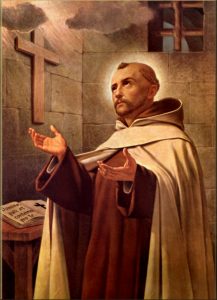HOMILY WEEK 02 04 – Year II
From Exile to a New Creation:
Memorial of St. John of the Cross
(Is 41:13-20; Ps 145; Mt 11:11-15)
****************************************
“The hand of the Lord has done this.”
This sentence, from the prophecy of Isaiah in the first reading, can be taken in two ways. Ultimately, its deepest meaning is an invitation for us to place our faith in Jesus and participate in the new creation he is bringing about.
The Word Among Us provides us with the literal meaning. After fifty years in exile, the time had come for God to lead the people of Judah home. Decades earlier, they had been subjected to a forced march through the rough terrain of Jordan and Syria before entering Babylon. But now, Isaiah prophecies that God will lead them back along a lush, fertile road. They will follow the same route as before, but the journey will be radically different. It will be clear that only God could have provided so much life – both in them and around them – in such a lifeless environment, as their exile comes to an end.
The gospel today hints at a much deeper meaning with great implications for us. First, we are told Jesus was teaching his twelve disciples. These “twelve” would become the twelve apostles who would be the foundation of a new Israel, representing the twelve tribes of a new Israel Jesus was bringing about.
Jesus hails John the Baptist as the greatest of all the prophets who pointed to his coming as the long-awaited Messiah, because John was the one who announced his arrival to the world – as the “Lamb of God.” That expression, to us now, is a catchphrase for the whole passion, death and resurrection of Jesus by which he would redeem not just the world, but the whole of creation.
The prophecy of Isaiah hints at all of that – a Redeemer will bring about a new creation – creation itself will be transformed: the wilderness will become a pool of water, and dry land a spring of water; the wilderness will blossom with the finest of trees – cedars, acacia, myrtle and the olive; the poor and needy will be satisfied, fear will be overcome and there will be great rejoicing.
Faith in Jesus as the Messiah will make all this prophecy come true in our lives. Do we believe that God can bring new life to areas of our heart that have seemed dead for years? Or have we resigned ourselves to the thought that nothing could be done about them? Could we take seriously the comment of Jesus in the gospel, that the violent take heaven by force?
The title for Flannery O’Connor’s irresistibly powerful second and final novel, The Violent Bear It Away, is taken from the Douay-Rheims translation of this last phrase. Although interpreted in different ways, O’Conner claims this is a word of praise to the spiritually violent who manage to get into the kingdom. The “violent,” on this reading, are those spiritually heroic types who resist the promptings and tendencies of our fallen nature and seek to discipline it in various ways in order to enter into the kingdom of God.
As we place our faith in Jesus and open ourselves up to receive his Spirit, we will begin to see changes, even transformation beyond our expectations. As we persist in following Jesus and his Word, we will look back from where we came from and proclaim in gratitude, “The hand of the Lord has done this.”

St John of the Cross
Today the church honours St. John of the Cross, who certainly was both Elijah and John the Baptist to the people of his time. John was born in 1542 at Fontiveros, Spain. He entered the Carmelite community and was ordained in 1567. With the great Carmelite mystic, Teresa of Avila, he worked for the reformation of his order, and helped found the reformed (‘Discalced’) Carmelites. During his life, he suffered much, enduring imprisonment, humiliation and ill-treatment. His writings are both classics of spiritualty and of Spanish literature. His best-known works are The Ascent of Mount Carmel, The Dark Night of the Soul, and The Living Flame of Love. He died in 1591, was canonized in 1726 and proclaimed a Doctor of the Church in 1926.
Elijah was fed by a raven in the desert. John the Baptist lived on locusts and wild honey in the wilderness. The Eucharist is manna for the journey into the wilderness and desert of our society by which God nourishes us, through Word and Sacrament, to be prophetic in communicating the unconditional love of God that Jesus Christ shared with us.
May our celebration deepen our faith in Jesus as the Messiah and Lamb of God, help us experience his forgiveness and healing, and blossom in the new creation he has brought about.



